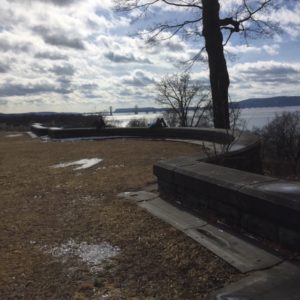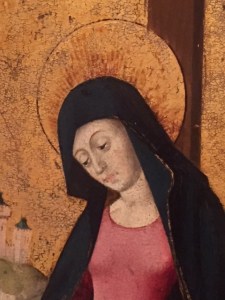Palm Sunday I was walking towards Friends Meeting at Cambridge (FMC) when I caught sight of a small procession outside the Swedenborg Chapel. Or, as a little boy walking along Kirkland Street near me exclaimed to his father, “It’s a little parade!” Members of an African-originated faith group, I’m guessing, the singing procession-members wore white clothing and red hats and, waving palm fronds, marched single-file along the chapel’s sidewalk behind one of their members who held a carved, wooden cross a foot or so above his head.
As we stood together watching this procession across the street I wondered: Will the father tell his child the story behind this little parade? He did not. So, I confess, I actually considered telling it, myself (Yikes!). But, thank you Jesus, instantly I realized the pair would simply dismiss me as crazy, a zealot, a weird old lady—so kept my mouth shut. And, soon, off they and I went in different directions.
Sitting in deliciously-long silent worship at FMC, I realized that the next time I’d be sitting in that space would be Saturday, April 2oth, at my mother’s memorial—where plenty of Pat Wild stories, celebratory and bittersweet, would be told. (Wilds are storytellers.) And about Story. And about the story I’d been tempted to tell on Kirkland Street. About why I’d been tempted. (More about Story has come since.)
On Sunday I realized a couple of things. My impulse to share the Palm Sunday story had been about my belief that it’s important to listen to the Stories most meaningful to our friends and neighbors. (Such gratitude for Robin Wall Kimmerer and all she has taught me about origin stories.) I shared this belief with my Sunday school students—high school students—when we studied the Bible. “This book, which early Quakers knew very well, remains incredibly important to millions of people throughout the world,” I told them. “Your lives will be filled with references to this book. So whether or not you believe every word, as world citizens you’re going to need to have at least a cursory understanding. Otherwise, you’re going to miss a lot.”
Had that father not explained why those beautifully-clad, dark-skinned people across the street waved those palms and sang because he didn’t know? Or, perhaps, he did know, maybe better than I, but bore such pain around twenty-first century Christianity that he chose to remain silent? His silence invited me, sitting in silence, to go deeper about that story. And suddenly I realized something.
In storytelling there’s a device known as “a McGuffin”: a thing or a situation important to a character but which listeners (or moviegoers), who know more about how the story is unfolding than the character does, care nothing about. (The most famous example is the envelope filled with money Janet Leigh steals in Psycho. That envelope is a McGuffin.) Thinking about the Palm Sunday story, I suddenly wondered if, perhaps, Jesus’s triumphant entrance into Jerusalem isn’t a McGuffin.
Because why’s he going there? To celebrate Passover. We tell Jesus’s triumphant entrance with such sadness—because we know what will happen later in the week. We know how this story ends. Jesus didn’t. A Jew, he was observing one of his faith’s most significant rituals by deciding to join his dearest friends to collectively remember The Exodus Story. (And what a powerful Story!)
So, now, okay, here’s where my Wild DNA kicks in; I am compelled to leave this tale better than I found it. Why did Jesus pick Jerusalem to celebrate Passover? Well, because those famous sisters, Mary and Martha, who’d patched up their differences and had agreed to perform the pre-Passover cleansing rituals together, to cook together, and discuss theology with Jesus together while their brother, Lazarus, did the washing up, had invited Jesus and his followers. (Their hometown of Bethany’s near Jerusalem. I looked it up.)
The denouement: As I write this, the world mourns the terrible destruction of Paris’s Notre Dame cathedral, an ancient, wondrous edifice I, like so many, have visited and been awed by—so much so that whenever I despair of my species, I remind myself, “Well, at least humans built Notre Dame.”
“Nothing gold can stay,” Frost tells us. Things fall apart. A mighty cathedral can collapse.
But Story stays.
Let’s tell some.











